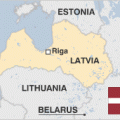
California Online Poker Joint House Hearings PlannedÂ

California is to hold online poker hearings this month, but is the gaming industry too divided for a bill to pass this year? (Image: kids.britannica.com
California is to hold joint Senate and Assembly committee hearings to push forward its efforts to legalize and regulate online poker.
While no date or agenda has been set, the hearings will have to be held before March 1st, the deadline for committees to hear bills related to taxation, Senate GO Committee Director Art Terzakis said this week.
And there’s a hell of a lot to be ironed out between the competing online poker bills that have been brought up for consideration during this legislative period.
There has been a considerable amount of negotiation going back and forth between the different factions in the state, and all signs point to the debate continuing.
Four Bills
California currently has four online poker bills floating around the legislature. The first to be introduced this year, AB9, is sponsored by Mike Gatto, and would restrict licenses to existing tribal operators and card rooms within the state only, making no room for the state’s racetracks.
As with draft bills of previous years, Gatto’s contains strong “bad actor” language, meaning that it seeks to preclude companies, or the “tainted assets” of companies, that offered online gaming to Americans after the Unlawful Internet Gambling Enforcement Act of 2016 had made it illegal to do so.
That means it would bar PokerStars from inclusion in a regulated market.
Assemblyman Reggie Jones-Sawyer’s Bill AB167, meanwhile, is far more inclusive. It ditches the fierce non-severable bad actor clause of his bill of last year and opens the door for the racetracks to participate in the market.
Tribal Schism
The remaining two latest bills are “shell” bills, which include no regulation at all. Instead, they act as vehicles to carry the debate through the legislative process, to be filled in at a later date when regulation can be agreed.
These were introduced by Senator Isadore Hall and Assemblyman Adam Gray, who are chairs of Senate and Assembly Government Organization committees of their respective houses, and as such have been able to facilitate the forthcoming hearings.
The issues of bad actors and the inclusion of the racetracks have been the rocks on which previous regulatory efforts have foundered, and they remain hugely divisive and contentious.
In 2014 a schism developed between the Morongo Band of Mission Indians, allied with California’s biggest card rooms, and a coalition of 13 tribal operators, who united behind the Jones-Sawyer and Correa bills, which were against bad actors.
The Morongo and the card rooms had a commercial agreement that PokerStars would provide their online poker platform, should California choose to regulate, and refused to endorse the bills.
Fragmented Industry
The most vocal of the anti-PokerStars coalition was the Pechanga tribe, which is also vehemently against racetrack participation. However, the defection of several of its former allies has perhaps led Pechanga to soften its stance, towards PokerStars at least.
At the recent meeting of the National Indian Gaming Association in San Diego, representatives of Pechanga and its coalition partners proposed a unification of the tribal gaming industry, working with PokerStars against a common enemy: the racetracks.
Although we’re not sure how PokerStars feels about this.
What is for certain is that gaming industry in California remains fragmented, and, with a poker bill needing two thirds of the legislature’s vote to succeed, unification is needed across the board, and it’s hard to see that happening. Not this year, at least.















These idiots arguing about legalizing online poker, meanwhile, here I am in California playing an online poker tournament for real money. You can’t stop me LOSERS!